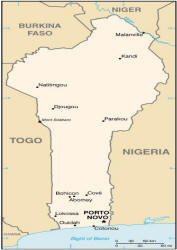


Country Profile Area: 112,620 sq km. Capital: Porto-Novo Population: 8,791,832(CIA 2009 est.) Language: French ( Official), Fon, Yoruba and other languages. Date of independence: 1st August 1960. Currency: CFA Franc (XOF) Religion: Christian, Muslim, vodun and indigenous religions. National Day: Indepence Day |
|
Benin, formally known as Dahomey, is a West African country bordered by Togo to the west, Nigeria to the east, Burkina Faso and Niger to the North, and Bight of Benin to the south. Benin has a tropical climate. The weather is hot and humid in the south and semi arid in the north. Benin has two rainy season and two dry seasons. The main rainy season is from April to July, and a shorter less heavy rainy season from September to November. The main dry season is from December to April, and a short cooler dry season from late July to September. Benin has a mixture of ethnic groups which include the Fon , also known as Gbe, Aja, Yoruba, Bariba, Peulh, Ottamari, Yoa-Lokpa and Dendi. Historians say that some of these groups migrated to the area as they fled from the fear caused by slave trade in the West African region They formed the small Kingdom of Dahomey whose borders were expanded through a military culture. The Kings of Dahomey sold their war captives as slaves and the region became a hotspot for the trans-Atlantic slave that it was called the Slave Coast. The Kingdom of Dahomey was conquered and taken over by the French in the 1890s. It became known as French Dahomey and was included in the French West African colony. The Republic of Dahomey was granted autonomy in 1958 and gain full independence on 1st of August 1960. Porto-Novo is the capital of Benin but the seat of government is located in Cotonou, the country’s largest city and commercial centre. The country is divided into twelve administrative departments. Benin’s economy is largely dependent on subsistence agriculture, cotton production and regional trade. The country is rich in cotton, cassava, corn, beans yams, palm oil, peanuts and livestock. |

Yayi Boni
President of Benin
12 departments;
Alibori, Atakora, Atlantique, Borgou, Collines, Kouffo, Donga, Littoral, Mono, Oueme, Plateau, Zou